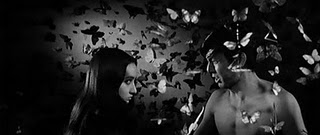by Raj Ranade
Annu Mari and Joe Shishido in Branded to Kill
Right on the heels of the Summer Classic Film Series, the Kentucky Theatre will be starting a free Japanese film series on Thursday nights starting October 21st. Sponsored by UK’s Japan Foundation, the series is an eclectic collection of 1960s Japanese Film, starting off with Hiroshi Teshigahara’s The Face of Another, a disturbing sci-fi film about a disfigured accident victim trying to put his life back together with a skin mask molded from a stranger’s face.
The opening of the film series happens to coincide with the newly restored Blu-Ray release of a film that has not only been cited as one the best Japanese films ever made, but as one of the best films period. (Seven Samurai (The Criterion Collection) [Blu-ray] ) But don’t let the lofty status of Akira Kurosawa’s 1954 film Seven Samurai scare you away. Seven Samurai also happens to be the ur-text of the “guys on a mission” movie, an indirect inspiration to everything from The Dirty Dozen to The Expendables, and the thrill of its action has held up shockingly well over the years. The film is centered around the titular warriors and their banding together to defend a small village from bandits, but over a truly epic three hours, Kurosawa weaves together a novelistic tapestry that contains rich explorations of love, honor, and battle tactics. All of this is tied together by a great performance from the legendary Toshiro Mifune, an actor often regarded as Japan’s Clint Eastwood.
) But don’t let the lofty status of Akira Kurosawa’s 1954 film Seven Samurai scare you away. Seven Samurai also happens to be the ur-text of the “guys on a mission” movie, an indirect inspiration to everything from The Dirty Dozen to The Expendables, and the thrill of its action has held up shockingly well over the years. The film is centered around the titular warriors and their banding together to defend a small village from bandits, but over a truly epic three hours, Kurosawa weaves together a novelistic tapestry that contains rich explorations of love, honor, and battle tactics. All of this is tied together by a great performance from the legendary Toshiro Mifune, an actor often regarded as Japan’s Clint Eastwood.
If you’re instead looking for a film as radical, loopy, and absurd as Kurosawa’s film is classical, sincere, and noble, you might want to take a look at my unofficial addition to the Kentucky’s film series, the 1967 film Branded to Kill (Branded to Kill (The Criterion Collection) Spine #38 on DVD, or through Netflix instant streaming). A feverish blast of pop-art energy, this film famously got its director Seijun Suzuki blacklisted from Japanese studios for a decade due to its experimental daring (“Suzuki makes incomprehensible films…[and] should open a noodle shop or something instead,” said his studio boss in a public statement firing him).
on DVD, or through Netflix instant streaming). A feverish blast of pop-art energy, this film famously got its director Seijun Suzuki blacklisted from Japanese studios for a decade due to its experimental daring (“Suzuki makes incomprehensible films…[and] should open a noodle shop or something instead,” said his studio boss in a public statement firing him).
The film tells the story of Goro Hanada, the No. 2 ranked contract killer in Japan with walnut-bump cheeks and an intense sexual fetish for the smell of boiling rice. The questions of who created the rankings, why they matter, and how Hanada developed this most bizarre of fetishes are never exactly explained, but logic isn’t exactly the point here. Instead, the movie is all momentum as Hanada hunts and is hunted by contract killers No. 1-4. Suzuki’s complete disregard of any form of exposition can make Branded to Kill a little difficult to follow, but there’s more than enough pleasures to compensate for any confusion: a visual style that splashes visual abstraction and dashes of animation across the screen, the creepy/sexy pull of a femme fatale who plucks off butterfly wings for fun, absurdist action scenes like a day-long Mexican standoff that includes a visit to a fancy restaurant and multiple bathroom stops. It’s not hard to see why directors like Quentin Tarantino and John Woo have called the film an inspiration, and if the movie is ultimately overwhelming, it’s still excess of the best possible sort.








